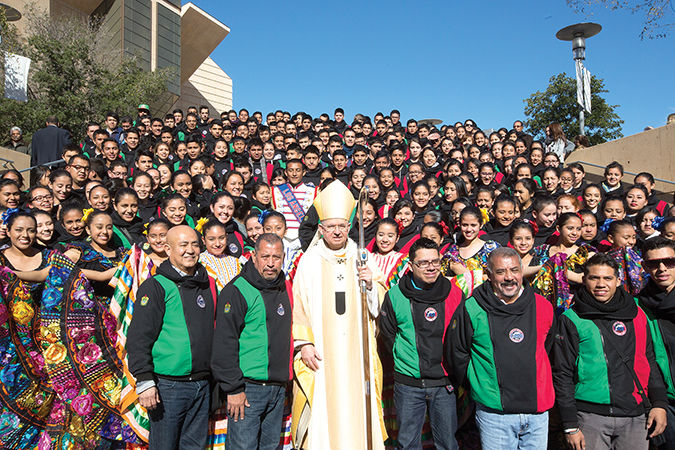For more than 25 years now, the United States Catholic bishops have recognized the first week of every new year as National Migration Week.
This is intended to remind us that America is a nation of immigrants and that the Church in America is a Church of immigrants. I worry sometimes that we are forgetting this. But it is true.
With the exception of our Native American brothers and sisters, almost all of us can trace our family tree back to roots that lie in some foreign land where our ancestors came from. This is the beauty and genius of America and it is the source of our national character and creativity and our rich cultural heritage.
As a nation, we begin this new year once more facing the unfinished business of reforming our immigration system.
Our system has long been broken past repair and every day we see the human consequences — new injustices, family tragedies, lost opportunities.
Too many families are being torn apart by deportations, uncertainty about their “status,” and delays in our visa process that can take years, even decades. Millions of men and women who are immigrants are being exploited in the workplace and forced to live in society’s shadows without rights or benefits.
There have been well-intentioned efforts to try to address some of the injustices created by this broken system.
Starting this month, a new law here in California will enable undocumented immigrants to get drivers’ licenses. On the national level, President Obama has announced an executive action that would grant work permits and temporary protection from deportation to millions of undocumented persons who have been here for five years or more or who have U.S.-born children or spouses.
These are common-sense measures that will bring temporary relief to millions of people. But they are no substitute for the comprehensive immigration reform our nation needs. Our system is broken and needs to be modernized to meet the realities of a global economy. Everyone knows that.
Immigration poses political challenges but also moral challenges. And at some level, I believe, for Catholics the issues are spiritual.
The theme for this year’s National Migration Week is this: “We Are One Family Under God.”
This is the basic teaching of the Scriptures and the Catechism — that the Church is the family of God. Those aren’t empty words. We are called to live what we believe. God is expecting nothing less from us.
If the Church is a family, that means we are all brothers and sisters. And God intends us to be our brothers’ keepers and our sisters’ keepers. We have to take responsibility for others and take care of them — even people we don’t know and will never see.
We are all family. And family has to stick together and help one another. If one member of the family is suffering, we are called to help.
In God’s eyes, people do not cease to be our brothers and sisters just because they have an irregular immigration status. There is no excuse for indifference or for treating someone else with less respect or love.
We are called to love and love cannot be divided. We can’t close our hearts to any of our brothers and sisters without closing our hearts to God.
I’m afraid this has become a problem in our current debates.
We have been debating comprehensive immigration reform for years now, without much progress. Perhaps if we really believed that the people affected were members of our family, we would feel more urgency.
We all know what needs to be done. We need reforms that will keep our borders secure, that will keep families together, that will give rights to workers, and that will provide a generous path to citizenship for those who are undocumented.
But in order to do all that, I think we need a change of heart, a deepening of our perspective — so that we can understand the urgency of our task.
In his message for this year’s World Day of Peace, Pope Francis writes: “We know that God will ask each of us: What did you do for your brother? The globalization of indifference, which today burdens the lives of so many of our brothers and sisters, requires all of us to forge a new worldwide solidarity and fraternity.”
Let’s pray for that grace this week — for ourselves and for our leaders. May we grow in love and experience a new sense of solidarity and fraternity with our brothers and sisters, especially those who are suffering and must vulnerable.
And let us ask our Blessed Mother Mary to guide our leaders to walk the path of cooperation as they seek to enact the immigration reforms that our nation needs.
Archbishop Gomez is the author of Immigration and the Next America: Renewing the Soul of Our Nation.

